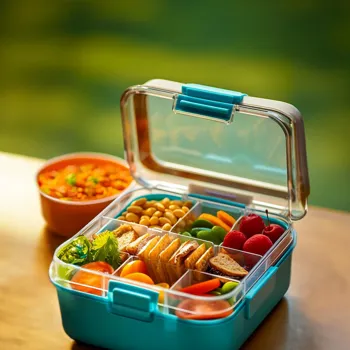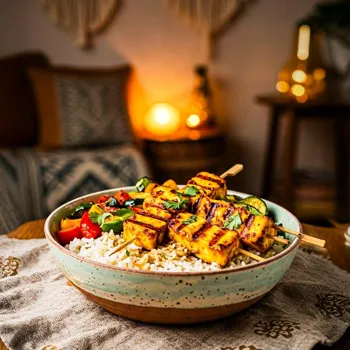Navigating Dining Abroad with Food Allergies: Essential Tips for Safe and Savory Travel Experiences. Explore now!
Namaste and welcome, globetrotters! Planning a trip abroad is exciting, but if you or your
loved ones have food allergies, it's essential to be extra prepared. Dining out can become a bit tricky, but with a little foresight, you can have a safe and enjoyable culinary experience.
Today, we'll explore ten practical tips to help you navigate dining abroad with allergies and relish every tasty moment without the worry.
Research and Plan Ahead
Before you even pack your bags, research the local cuisine of your destination. Identify dishes that commonly contain your allergens. For example, if you're allergic to nuts, be mindful of dishes like certain Indian curries or Mediterranean desserts that might contain nuts or nut oils.
Look up translations of your allergies in the local language. Websites like "Allergy Translation" can be super helpful. Also, check online forums and allergy-related communities for tips and restaurant recommendations from fellow travelers with allergies. Planning is half the battle won!
Create Allergy Translation Cards
Translation cards are your best friends! Get them professionally printed or make your own. Clearly state your allergies in the local language. Include specific phrases like, "I am allergic to [allergen]. Even a small amount can make me very sick.
" Showing the card to restaurant staff ensures clarity and reduces the risk of miscommunication. Consider creating multiple cards with different levels of detail for varying dining situations. Laminating them helps them last throughout your journey!
Don’t rely on simply saying the allergen name; the translation is key.
Learn Basic Phrases in the Local Language
While allergy cards are crucial, knowing a few basic phrases in the local language can make a big difference. Learn how to say "I have an allergy," "Does this contain [allergen]?" and "Please prepare this without [allergen].
" Even a basic understanding shows respect and willingness to communicate, making restaurant staff more receptive to your needs. Download a language learning app like Duolingo or Memrise and practice those phrases before you go. A simple "Dhanyavaad" (thank you) can also go a long way!
Pack Safe Snacks and Meals
When flying or during long travel days, pack your own safe snacks and meals. Airports and airplanes aren't always allergy-friendly, and options can be limited. Pack items like granola bars, fruit, nuts (if you're not allergic!), and sealed meals.

This prevents the need to rely on unfamiliar food sources when you're hungry or in a rush. It's also a good idea to pack a few extra safe snacks in case of unexpected delays or itinerary changes. These can be a lifesaver!
Choose Allergy-Friendly Accommodation
Consider accommodations with kitchen facilities, such as apartments or hotels with kitchenettes. This allows you to prepare some of your own meals, ensuring complete control over ingredients. Look for accommodations that have a good reputation for dealing with allergies.
Check online reviews or contact the hotel directly to inquire about their allergy policies and procedures. Even a simple microwave and refrigerator can be a huge asset when you have food allergies. The peace of mind of preparing your own meals is well worth it.
Be Cautious of Cross-Contamination
Cross-contamination is a significant concern, especially in restaurants. Explain to the staff that your allergy is serious and that you need your food prepared separately using clean utensils and surfaces. Inquire about the restaurant's procedures for avoiding cross-contamination.
Don't hesitate to ask questions about how they prepare their food and if they can guarantee separation of your meal from allergens. Trust your instincts; if you are not confident in the restaurant's ability to accommodate your needs, it's best to choose another option.
Read Menus Carefully
Scrutinize menus for allergen information, but don't rely solely on them. Menu descriptions may not always be accurate or complete. Ask the restaurant staff about the ingredients in each dish, especially hidden allergens like nut oils or traces of dairy.
Many restaurants now offer allergen menus, but always double-check with the server to ensure clarity. If you're unsure about an ingredient, it's always safer to err on the side of caution and choose something else. Remember, your health is your priority.
Consider Restaurant Choices Wisely
Opt for restaurants known for their transparency and willingness to accommodate dietary restrictions. Ethnic cuisines like South Indian, where the focus is often on fresh ingredients and simple preparations without heavy reliance on common allergens, can be good choices.

Smaller, family-owned restaurants may be more willing to cater to your needs than large chain establishments. Read online reviews for recommendations from other allergy-conscious travelers. A little research can go a long way in finding allergy-friendly dining spots.
Carry Your Medication
Always carry your allergy medication, such as antihistamines or epinephrine auto-injectors (like EpiPen), with you at all times. Ensure that your medication is easily accessible, not buried deep in your luggage.

Learn how to use your medication properly and educate your travel companions on how to administer it in an emergency. Keep a copy of your prescription with you in case you need to refill your medication while abroad. Better safe than sorry!
Trust Your Gut
If you feel uneasy about a situation or are unsure about the safety of a dish, trust your instincts. It's always better to decline a meal than to risk an allergic reaction. Don't be afraid to ask questions and to advocate for yourself.
Your health is the most important thing, and it's okay to be assertive about your needs. Bon appétit, and travel safe!
AI Generated Content. Glance/InMobi shall have no liability for the content











